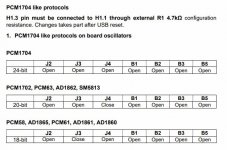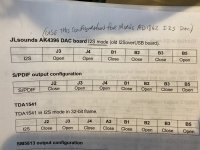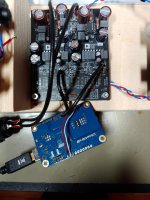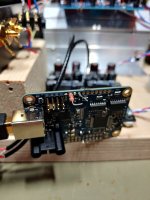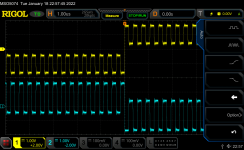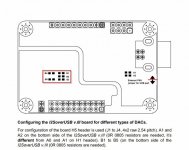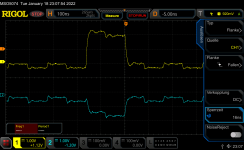Without searching through the thread or reverse engineering the digital input logic, may I ask if the dac board is designed to accept native AD1862 digital format, or something like I2S (where the term 'I2S' refers to the digital interface protocol, not the hardware bus)?
Jumpers are now J2-J4 open, B1-B3 closed, B4-B6 open.
Resistor removed.
Same result. Crackling sound and no music...
Resistor removed.
Same result. Crackling sound and no music...
Attachments
Last edited:
U10 is not on my board either. Comes from Lyuben that way.
The most recent purchased I2SoverUSB has U10 installed? Both boards are v.III
The most recent purchased I2SoverUSB has U10 installed? Both boards are v.III
Last edited:
Thank you Asilker and Paddy.
PSU2 PCB ground on center connected to chaiss through cl60.
Yes,I need fuse on primary.
R channel was ok.
L channel had smoke from opamp.
I am thinking that I snapped leg inside DAC chip when I replaced,I input opposite first time.
Taking out DAC chip was not easy and leg was pretty soft.
PSU2 PCB ground on center connected to chaiss through cl60.
Yes,I need fuse on primary.
R channel was ok.
L channel had smoke from opamp.
I am thinking that I snapped leg inside DAC chip when I replaced,I input opposite first time.
Taking out DAC chip was not easy and leg was pretty soft.
Nice matching cases Paddy Garcia!! Well done on completing the dacs, nice job!!
@baggerbole - if you are getting static type noise then it is likely that something is wrong on your digital lones - eg lrck and bck mixed up or maybe a ground not connected. That heatsink n the jlsounds board gets pretty warm, and that is normal. If you have a multimeter, you can check that you have signal flowing on the digital lines - your dmm will measure the high frequency i2s data as DC votlage. So with material playing you should read a DC voltage of .7-2V on each of bck, lrck and data (when something is actually playing) (measured against ground). If you have signal on those lines, then there is a very good chance it is one of the i2s lines mixed up.
@baggerbole - if you are getting static type noise then it is likely that something is wrong on your digital lones - eg lrck and bck mixed up or maybe a ground not connected. That heatsink n the jlsounds board gets pretty warm, and that is normal. If you have a multimeter, you can check that you have signal flowing on the digital lines - your dmm will measure the high frequency i2s data as DC votlage. So with material playing you should read a DC voltage of .7-2V on each of bck, lrck and data (when something is actually playing) (measured against ground). If you have signal on those lines, then there is a very good chance it is one of the i2s lines mixed up.
Thank you Asilker and Paddy.
Yes I need fuse on primary.
I connected PSU2 PCB center GND to chaiss through cl60.
L channel was ok.
But R channel have got smoke from opamp.
I believe that I snapped leg instead DAC chip
when I replaced. Chip was tight mounted and leg was soft so It was difficult to take out when I noticed mounted opposite.
Yes I need fuse on primary.
I connected PSU2 PCB center GND to chaiss through cl60.
L channel was ok.
But R channel have got smoke from opamp.
I believe that I snapped leg instead DAC chip
when I replaced. Chip was tight mounted and leg was soft so It was difficult to take out when I noticed mounted opposite.
Those legs are soft, I have bent one myself but was able to carefully straighten it.
Smoke from the op amp isn't good, did you insert it in the correct direction?
Smoke from the op amp isn't good, did you insert it in the correct direction?
@miro: As on Vunce´s I2S board there is no U10 installed. It looks like a layout design revision.
The jlsounds doc describes B1 to B5 short bridges. On my board it´s B1 to B6 as you can see from first picture in post #3245.
@woodturner-fran: Yellow trace is lrck, blue is bck (first screen shot)
Yellow trace = DL, Blue trace = DR (third screen shot)
The jlsounds doc describes B1 to B5 short bridges. On my board it´s B1 to B6 as you can see from first picture in post #3245.
@woodturner-fran: Yellow trace is lrck, blue is bck (first screen shot)
Yellow trace = DL, Blue trace = DR (third screen shot)
Attachments
Last edited:
AndyHi, friends! Wondering if I could have help answering a few questions initially before choosing to proceed or not. Sorry for not reading all posts in the thread yet.
1: How good does this sound? Is it warm, analog, transparent, extended, or all the above?
2: Has anyone tried using the Zen I/V converter for this project?
3: Had anyobe tried a tube output stage and or output transformers?
4: Are there any active GB’s with boards left?
5: Are there parts not possible to get any longer that must be sourced elsewhere (Paddy??)?
I like NOS and R2R. Thinking about Audio Note, but this is more tempting as I wanna do it myself 🙂
Regards,
Andy
I can't answer all your questions but here's a few.
I think woodturner fran has tried tube IV and I think also Zen IV. You may find links in the link on page 1.
I have a board you can have along with some auxiliary boards....PSU1 and some u.fl adaptors.
The only tricky part is the AD1862 itself but as you point out, Paddy is the man.
It is an amazing sounding dac and I havent really tweaked mine much yet.
- Home
- Source & Line
- Digital Line Level
- DAC AD1862: Almost THT, I2S input, NOS, R-2R
